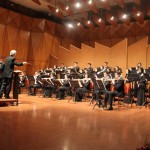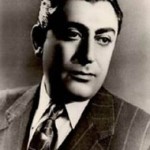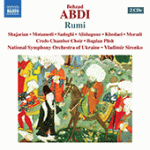In a momentous celebration of two decades, the “Arasbaran Cultural Center” was the stage for the 20th anniversary of “Harmony Talk”, an online journal that has become a cornerstone in the music community. Sadjad Pourghanad, the editor-in-chief, delivered a speech that resonated with gratitude and vision.
Tag Archives: Kamran VatanAbadi
Celebrating 20 Years of Harmony Talk’s Journey: Resilience, Evolution, Honoring the Legacy and Navigating Future Growth
Latest posts
- Transition to Enlightenment: Six Lectures on Mozart’s String Quartets (5)
- Nasser Masoudi: The Voice of Gilan and a Legacy of Iranian Music
- Farhad Poupel: The Voice of the Shahnameh in the Orchestras Around the World
- Five Major Myths About Mozart’s Life
- Bahma Rajabi Passed Away!
- Reza Vohdani; Unveiling unpublished works, preservation of Iranian classical music
- Ahmad Pejman Passed Away!
- Timeless or Timely: The Role of Historical Context in Defining Artistic Value
- Leading the Charge in Censorship
- The Legacy of Khosrow Jafarzadeh
- Transition to Enlightenment: Six Lectures on Mozart’s String Quartets (4)
- Fereydoun Shahbazian, An Iranian Musical Icon Passed Away
From Past Days…

Transition to Enlightenment: Six Lectures on Mozart’s String Quartets (4)
The collaboration between Mozart and Haydn blossomed during the late 18th century in Vienna, a city that served as the epicenter of musical innovation. Amidst this vibrant cultural milieu, the two composers developed a profound friendship that extended beyond mere professional admiration. This connection is reflected in the six string quartets dedicated by Mozart to Haydn, aptly known as the “Haydn Quartets.”

Rouhollah Khaleghi Artistic Center established in Washington DC
Golnoush Khaleghi (1941-2021), a Washington-based Persian musician and the daughter of the contemporary Persian (Iranian) composer and theoretician Rouhollah Khaleghi (1906-1965) founded a musical center called RKAC to keep the name and the work of her father alive.

Tehran Flute Choir Established
Tehran Flute Choir was established in 1394 (late 2015) by Firouzeh Navai. Tehran Flute Choir, Iran’s first largest flute choir, recruited its members mostly from young talented flutists of Iranian Flute Association. Featuring piccolo, flute, alto flute and bass flute, Tehran Flute Choir, directed by Firouzeh Navai, premiered under the batons of Saeed Taghadosi on January 7-8, 2016 at Roudaki Hall in Tehran.

Banan: the Artist of the Age
Gholam Hossein Banan was born in 1911 in Tehran. He was born in an affluent art-loving family who were Naser al-Din Shah Qajar (1848-1896)’s relative. The Qajar King was his mother’s uncle on her father’s side. He learnt his first lessons in music while his father sang Iranian avaz (improvised rhythmic-free singing), he then attended classes by the renowned Iranian composer, Morteza Neydavoud (1900-1990) along with his sisters; the composer is, therefore, considered as his first teacher. He then learnt Iranian avaz under the supervision of Mirza Taher Zia Resaee (Zia-o Zakerin) and Naser Seif in an oral manner.

A note on “Illusion or Ingenuity” article
The author of the “Illusion or Ingenuity” article, who is apprehensive of the future of the Music in Iran, enumerates some symptoms of the music weakening in the country for example decreasing in the quality of the music as well as lack of the innovation in creating them, a gradual decline in the music public taste and the drop in the application of layered sound and polyphony in music. He explains that one reason for this gradual weakening might be our unawareness of the fact that we are not so intelligent nation. He believes that we, Iranians, have a comprehensive “Illusion of the high national intelligence “that make us ignorant of the unfavorable realities of our music and consequently no searching for the remedy is taking place. His point of view brings to the mind a patient who thinks he is healthy, therefore delays the treatment and finally is killed by the disease. The author also refers to the national difficulties which gradually will lower the national intelligence score such as the increased rate of the immigration and brain drain, low quality of the nutrition, incompetence of the education system and etc and predicts that the condition of the music of Iran might deteriorate in the future because of the mentioned illusion of its great status.

Behzad Abdi’s opera Rumi was physically released by Naxos
Composing a traditional Iranian opera using the Iranian modal system, dastgāh, has always been my dream. I first approached this by composing an opera called Ashura followed by the operas Rumi and Hafez. I believe that in order to attract an international audience for Iranian opera, it is essential to fuse dastgāh with Western classical forms.

Principles of Playing Violin (IV)
Pattern No.3/1 Left hand finger Placement: 3/1/1: Landing Fingers on one String: In preliminary stages of training, an apprentice should pay attention to the principle of keeping fingers while placing them on the fingerboard. Professional violinists pay less attention to this principle. Novice player’s complying with this principle, in preliminary stages of training, has several…
Read More

New Technique for Playing Classical Guitar (I)
Joint application of the two techniques of “Lip” and “Nose” could be effectively applied for hearing and playing far-away intervals, by the Classical Guitar. Before this, a Classical Guitar player had to waive playing intervals not possible with the left hand, and had to replace or eliminate some notes, making it possible to play such intervals; specifically the capability of the left hand of the musician, was also a factor in such a selection. These methods are hereby illustrated by photographs and a video-file, in order to provide optimum comprehension of applying these methods, invented by the author; specifically the “Lip” technique, which is considered to be a more significant technique, emphasized by the author.

Harmony in the Iranian Music (II)
One of his works was the translation of Harmony, which was carried out with the help of Mozayyan al-Dowleh, and included a pamphlet based on which he used to teach the subject to the students of the school of music; the pamphlet was never published. It was, in fact, a kind of simple harmony for the piano with no quadriads, it rather featured the engagement of both the right hand and the left hand which was being taught at the music school for the first time. Salar-Mo’azez also composed military marches and hymns for schools, which he harmonized to be performed and piano. Likewise, he used to compose for military orchestras.

A Promising Concert by National Instruments Orchestra
The National Instruments Orchestra of Iran performed its first concert amid much hope and anxiety on July 18, 2015. The Orchestra is founded by Roudaki Cultural and Arts Foundation which is a semi-private foundation in Iran. The Arts Director for the National Instruments Orchestra of Iran is cand the Orchestra Executive Director is Sadjad Pourghand.